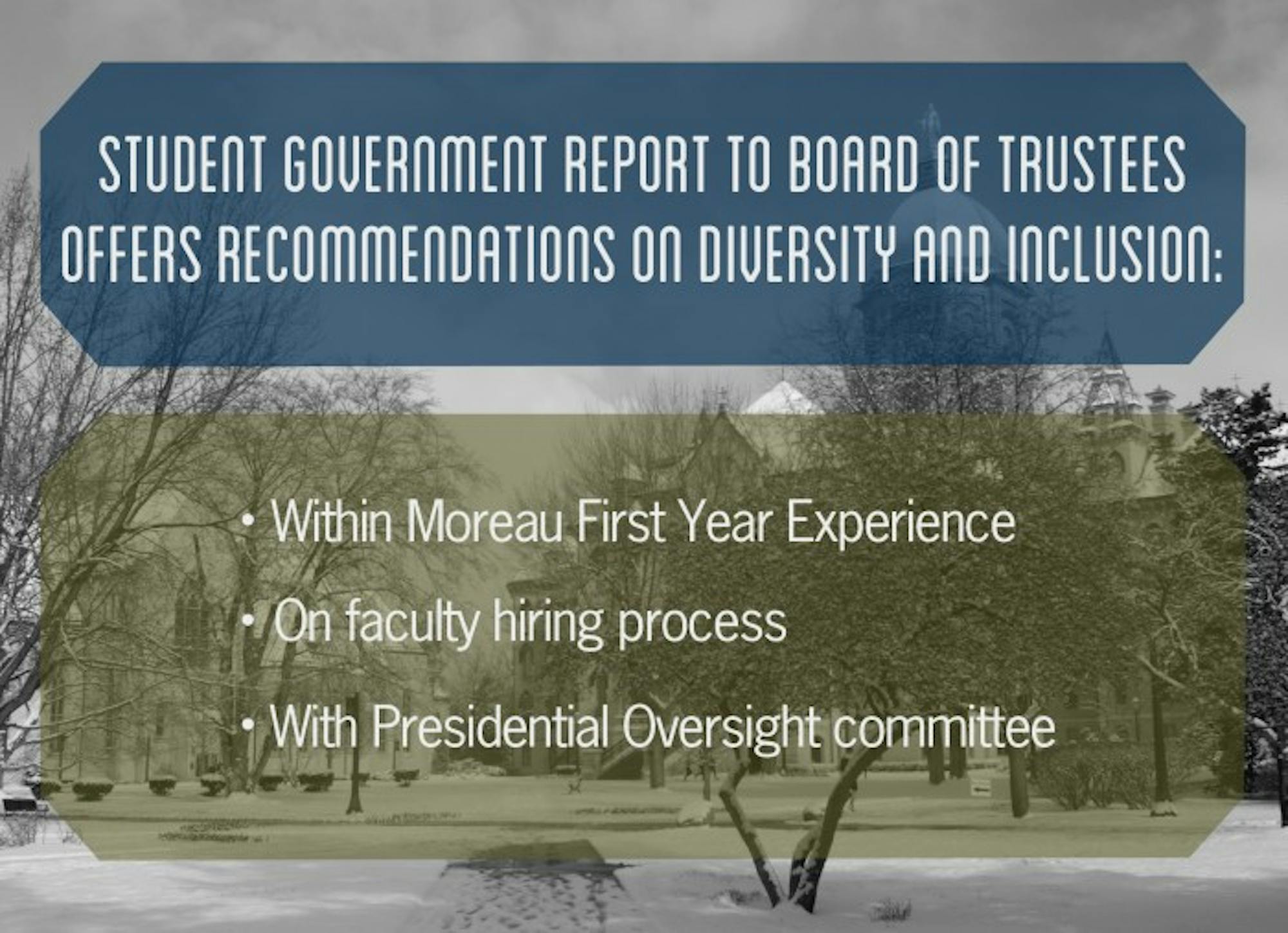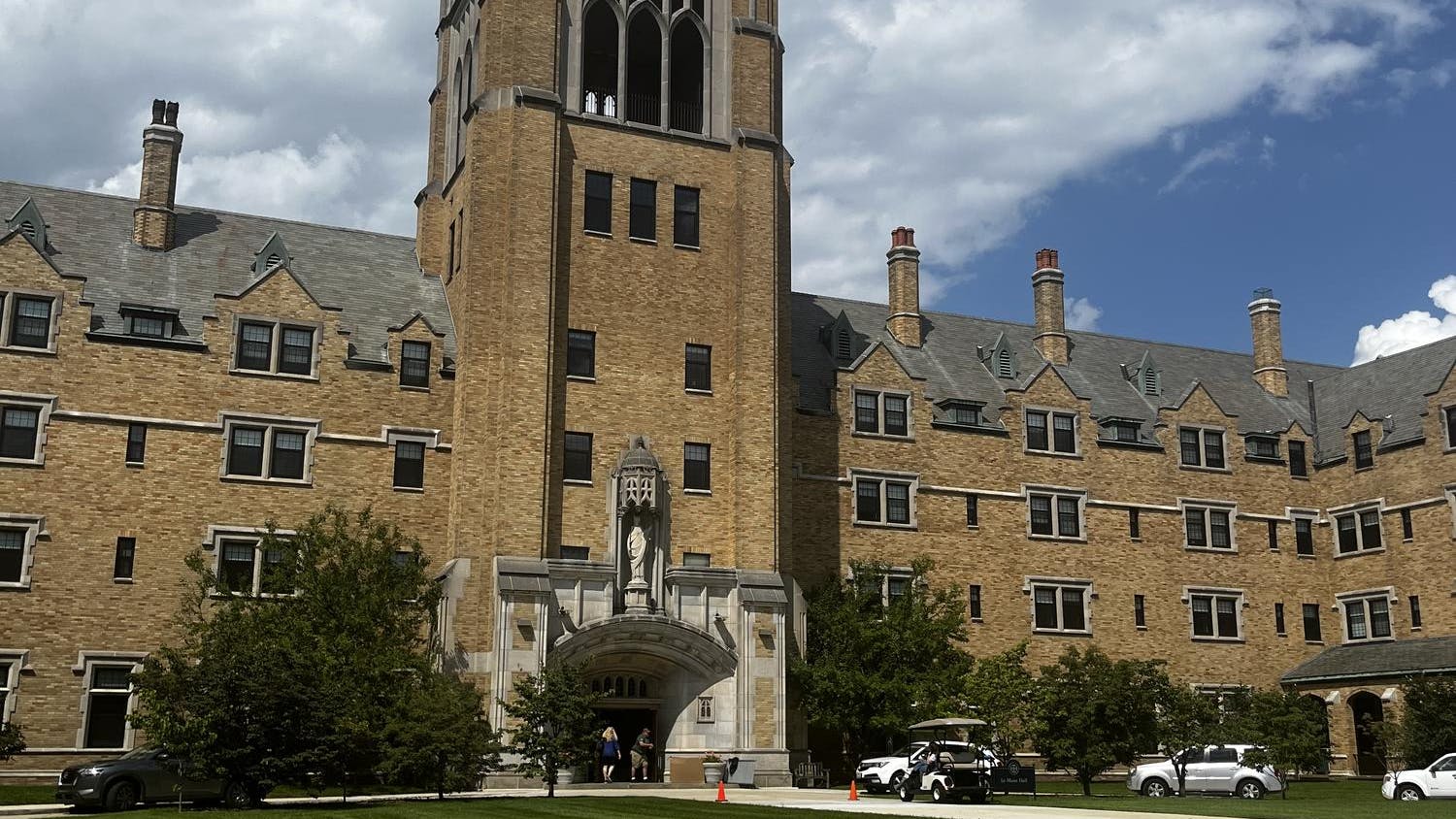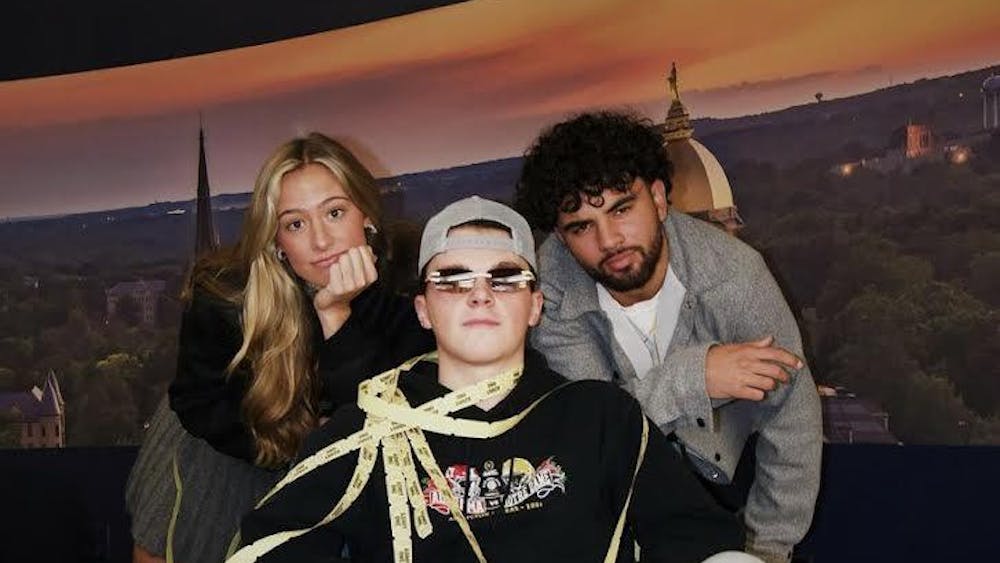As their final act as student body president, vice president and chief of staff, Bryan Ricketts, Nidia Ruelas and Sibonay Shewit will submit a report on diversity and inclusion at Notre Dame to the Board of Trustees on April 28. 
Ricketts said the board report is a path forward for increasing diversity and inclusion efforts at Notre Dame.
“We took on this project to really talk about the student perspective on diversity and inclusion, because we really want to leave behind a structure that can really help facilitate a partnership between students, student leaders and administrators,” he said. “I think, in the past 10 - 15 years, there has been a substantial increase in … the students who are committed to diversity.”
Ruelas said she has seen vast improvements even over the past four years she has spent at the University, particularly in the efforts initiated by both the administration and the student body.
“These efforts are ongoing, and I think that what we’re trying to do is just to give [the board] a direction to go, and a way to make it all fit together, and how we make a unified effort to address a pretty complex topic,” she said.
After receiving significant negative feedback on the treatment of diversity and inclusion in the Moreau First Year Experience course, Ricketts said the report explores improvements that can be made in the course's curriculum.
“We really should look at Moreau as a kind of case study that really outlines some of the common themes regarding diversity and inclusion, where there is a sort of misconnection between different kinds of efforts and what students are perceiving,” Ruelas said. “Especially because Moreau is brand new this year, it’s been very ambitious, and we acknowledge that and we really appreciate that.”
The report addresses issues with Moreau because it demonstrates student perception of the course, Ruelas said.
“In particular, we look at this and we look at how students view the course and view its shortcomings and the difficulties … and sometimes, it’s difficult to see how steps are being taken to improve it,” she said.
The administration is aware of these shortcomings, Ruelas said, and is truly working to improve them.
“We know there have been plenty of effort in trying to get feedback, and improve,” Ruelas said. “There are just a lot of pieces to figure out, and that makes it hard to figure out what to do next.”
The report highlights three issues that can be addressed in future iterations of the course, Ruelas said.
“The first one is that the course is meant to address the sort of lack of community, and try and build it from day one, and that’s why it’s a first year experience course,” Ruelas said. “The second one is that it’s a very big instrument for preparing and cultivating a readiness for conflict and conversations any time at Notre Dame. The third one is that there has been … these defensive cycles, where the students are saying there are problems and we’re not seeing solutions.”
This cycle starts when the students get angry, Ricketts said, and continues when the administrators cannot be fully forthcoming about the changes in the course.
“It’s this feedback loop of not actually having the conversation,” Ricketts said. “And I definitely think we’re highlighting it, not because of the discontent but because of it exemplifies this loop.”
The report also addresses the lack of consideration for diversity within the faculty hiring process at the University, Shewit said.
“So there’s nothing in the hiring process that talks about or addresses diversity directly, which we thought was important, not only because it’s an issue … but also because it doesn’t address diversity of competency, and we’re prepared to talk about it and engage with it,” Shewit said.
Shewit said a major goal of the report is to advocate for the creation of a community that was more welcoming to a diversity of opinions and ideas.
“This ... is such a big part of the University’s vision and mission, and if they claim that it’s part of their commitment, which they do, it should be reflected in the hiring process,” she said.
Ricketts also said there needs to be more involvement by the students on the President’s Oversight Committee on Diversity and Inclusion.
“One of the important things to understand about the President’s Oversight Committee is that Fr. Jenkins uses the committee as a Notre Dame-specific approach to diversity and inclusion,” Ricketts said. “So rather than having just one person in charge of diversity, Jenkins told every executive that they were responsible for diversity in their department. Everyone has to hold themselves accountable.”
Ricketts said the committee would be “more complete with a student perspective.”
“And what they can take away from it is a better way to serve the students,” he said.
According to Ricketts, this year's report was “a lot more straightforward” than the report presented by student government last year.
“Our recommendations are all practical, and they’re all able to be implemented,” he said.
Bringing awareness to student needs is also important, Ruelas said.
“Even though we’ve been through this whole report-writing thing once, and know what it takes, it’s much harder to follow up — we’re out of office, but we really want these points to hit home,” she said. “We really want the University to pay attention to what their students are saying.”
Even if their recommendations are not implemented directly, Ruelas said she, Shewit and Ricketts would be happy with the change they enacted through their administration.
“We left room, there’s room for creativity, there’s room for innovation, there’s room for forward thinking and active participation on behalf of the University,” she said. “I think that that is important and something that should be built upon.”
In the grand scheme of things, the report is a call to see real change from the University, Shewit said.
“There are efforts from the students and efforts from the administration and there’s a disconnect right now … and we want to see that unity in order to move forward,” she said.













